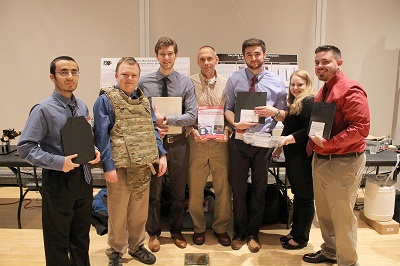News and Events
First Cecil-Frostburg Engineering Students Set High Bar at Research Symposium
 On May 5, six materials engineering students traveled across the state of Maryland to present their research at Frostburg State University’s annual College of Liberal Arts and Sciences Undergraduate Research Symposium. These FSU students, based at Cecil College in North East, Md., had never been to Frostburg in Western Maryland.
On May 5, six materials engineering students traveled across the state of Maryland to present their research at Frostburg State University’s annual College of Liberal Arts and Sciences Undergraduate Research Symposium. These FSU students, based at Cecil College in North East, Md., had never been to Frostburg in Western Maryland.
They returned on May 25 to become the first graduates of FSU’s B.S. in Engineering at Cecil College articulation program.
According to Dr. Eric Moore, chair of Frostburg’s Department of Physics and Engineering, these six students made a remarkable campus debut, showcasing projects that could be applied to the automotive industry and for military and law enforcement safety gear.
“The Cecil projects presented at the Undergraduate Research Symposium are timely and relevant, both for global resource management and for industry demand in the Cecil region,” said Moore. “Professor Hemphill and his students have set a high bar for students who will follow in their footsteps.”
That bar was set from Cecil campus near the northern tip of the Chesapeake Bay, under the supervision of Dr. Scott Hemphill, who coordinates the program for Cecil, advises students and teaches several courses. The program, he said, represented a life-changing opportunity for his students.
“They all have full-time jobs,” Hemphill explained. “If they had to go another route, there was no way for them to get an engineering degree at a community college. The program allowed them flexibility.”
James Bickling of Elkton, Md., had already been accepted into the University of Delaware’s civil engineering program when he learned of Frostburg’s materials engineering program at Cecil. Frostburg’s program fit his academic interests and made financial sense. In-state tuition was more affordable, and staying nearby allowed him to keep working.
It also helped Bickling and his partners focus on their research. They confronted a vexing automotive industry issue: how to recycle composites like carbon fiber. Strong and lightweight, composites help boost fuel efficiency but introduce drawbacks.
“The biggest issue that inhibits widespread use of composite materials is the reconcilability issue. Composite materials are not recycled easily because separating fibers from the matrix is extremely hard,” said Dr. Mahdi Norouzi, FSU assistant professor of physics and engineering.
Bickling’s team developed a technique to sort scrapped materials by fiber length, remove residual resin and create recycled composite material. The material they produced is physically comparable to short-fiber composites already in industrial use. They designed their process to integrate into existing automotive recycling infrastructure.
According to Hemphill, who also operates a professional materials engineering firm, the skills his students developed are highly applicable in industrial settings. Two of his students already have job offers. Another has been accepted to a graduate engineering program. They also found more of a personal connection than they expected of other programs.
Travis Wiles, also of Elkton, originally planned to attend University of Maryland, Baltimore County for mechanical engineering. When he learned of the Cecil-Frostburg program, he jumped at the chance to save money and advance his career near home, family and friends. At the symposium, Wiles marveled that Moore, his department chair, knew his name and stopped by to discuss his research.
“That’s been a wonderful thing, to have them invest in you and want to see you do well,” Wiles said.
With his partners, Wiles aimed to lighten the body-worn strike plates that protect soldiers from rifle fire. A pair of ceramic plates weighs 15-plus pounds. Their research demonstrated a technique to lighten ceramic plates by more than 20 percent while maintaining better than 99 percent of their original strength. As 3D-printing technology evolves, the research could help designers create lighter, stronger armor.
Wiles said he enjoyed the opportunity to present that research in Frostburg.
“It’s been a great experience, and definitely one I’m glad that I’ve had,” Wiles said. “Being able to show off a year’s worth of work – and see what other students have been doing – has been an enriching experience.”
Situated in the mountains of Allegany County, Frostburg State University is one of the 12 institutions of the University System of Maryland. FSU is a comprehensive, residential regional university and serves as an educational and cultural center for Western Maryland. For more information, visit the FSU web site or Facebook page. Follow FSU on Twitter @frostburgstate
